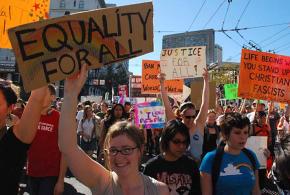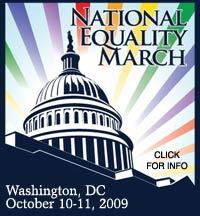Why marching matters
At a time when many people are disoriented and angry over Barack Obama's retreats and concessions to the right, the lesson is clear: we need to take action.
THE NATIONAL Equality March for lesbian, gay, bisexual and transgender rights is sending a message to Washington--and setting an important example for everyone who wants to see progressive social change.
At a time when liberals, labor leaders and the left are increasingly angry, but mostly inactive, about the Obama administration's concessions to Republicans and the right, a new generation of LGBT activists are taking the initiative.
The demands of the march--federal legislation outlawing all discrimination against LGBT people--ought to be easily achievable. If, that is, the Democrats who control the White House and Congress would only make good on longstanding promises.
But they haven't. President Barack Obama has yet to act on his campaign pledge to push for repeal of the Defense of Marriage Act (DOMA), which bars the federal government from recognizing marriages of same-sex couples.
Nor has Obama moved to end the U.S. military's "don't ask, don't tell" policy toward gays in the military, even though the policy has caused thousands of LGBT people to be witch-hunted out of the armed forces.

Instead, LGBT people--like many others who looked to Obama's presidency with a sense of hope--have had to wait in line as the bankers and the Pentagon brass stake their claim on the U.S. Treasury and Obama's political capital.
THE OBAMA administration's refusal to push the repeal of DOMA helped spur veteran gay activist Cleve Jones, a collaborator with assassinated gay rights pioneer Harvey Milk, to back a grassroots call for a national march on Washington to demand full rights for LGBT people, including marriage.
As Jones put it in a speech in Chicago in September, "We don't have a laundry list for this march. We're marching for one demand, and one demand only. It's called the 14th Amendment of the U.S. Constitution. We are a people protected in all places governed by civil law in all 50 states, period. That's what we're fighting for.
"I believe we're equal. If you believe we're equal, it's time to act like it. A free and equal people do not settle for compromises. We do not accept timelines where we can't get that this year, but maybe if we fight for five years, we can get marriage in 20 years, and on and on. No--now is the time."
At first, established national LGBT groups and leaders were lukewarm--or even hostile--to the march. The argument was familiar: Activists have to give the Obama administration time to build political support for controversial legislation like repealing DOMA and "don't ask, don't tell," or passing the Employee Non-Discrimination Act (ENDA).
The provisions in ENDA--which in its current version includes transgender people--are badly needed. The legislation would prohibit employers from firing workers for being gay--which is legal in 30 states. In 38 states, people can be fired for being transgender.
But while Obama supports ENDA, it hasn't been a legislative priority, and is essentially sidetracked. And while Obama claims to stand behind his campaign pledge to repeal DOMA, his Justice Department earlier this year filed a court brief in support of this reactionary law.
All this is a bitter pill to LGBT people who looked to Obama to deliver "change we can believe in" on this issue--and it's reason enough for a national march to demand action.
But the trigger for the new LGBT activism was last November's passage in California of the Proposition 8 referendum that overturned same-sex marriage. Amid celebrations of Obama's victory in cities across the country, LGBT people and their supporters organized protest marches throughout California, and found a response across the country as well.
Many of those who led the protests had never been politically active before. Young people were at the core of new organizations like One Struggle, One Fight and Join the Impact. Friends and acquaintances networked through Facebook and Twitter, posted flyers in neighborhoods frequented by LGBT people, and mobilized hundreds, and even thousands, for protests to demand same-sex marriage and equality.
It was this activism that spurred Cleve Jones to endorse the grassroots demand for a national march for LGBT rights. And the enthusiastic response to Jones' efforts, in turn, has pushed establishment gay organizations that initially opposed the march into changing course. While these groups remain closely tied to the Democratic Party, the fact that they've had to shift under pressure reflects the growing grassroots movement.
SOME MIGHT conclude that LGBT activism and the march have taken off because of special circumstances--mainly, that the right has focused on attacking LGBT people as the last respectable bigotry, and that the Prop 8 issue spurred people into action.
But a closer look shows that the new LGBT movement has been produced by the same hard times--and hopes--shared by the working-class majority in this country.
Consider the effects of the economic crisis on LGBT people. At a time when jobs are harder to find than at any time in decades, the cost of being fired for one's sexual orientation is more devastating than ever. Further, with health care benefits being reduced or canceled, gays or lesbians who can't marry their partners have fewer opportunities to get coverage through their partners.
And the problem isn't just health care: according to New York Times reporters Tara Siegel Bernard and Ron Lieber, same-sex couples are routinely cut out of their partner's pensions and Social Security benefits--and they take a hit on taxes, too. "Nearly all the extra costs that gay couples face would be erased if the federal government legalized same-sex marriage," the writers found.
Those on the left who have criticized LGBT activists for focusing on marriage have completely missed the point: The issue is social and economic equality, and the recession has made the struggle to achieve it even more urgent.
In fact, class issues and solidarity have been central to the new LGBT activism. In Chicago, for instance, activists demonstrating for equal marriage joined protests in support of the Republic Windows & Doors factory occupation in December, and striking workers from SK Hand Tools attended a Cleve Jones speech in Chicago to ask for support.
Far from being a special case on the left, the LGBT movement is shaped by both the economic crisis and the widespread hope for political change following the disaster of the Bush years. What sets the activists apart is only the fact that small groups of people started organizing.
At a time when many are disoriented and angry over Obama's retreat on health care reform and other issues, the lesson is clear: we need to take action.
And as the economic crisis drags onward, others are drawing that conclusion. The huge statewide walkout by students, faculty and workers across the University of California system September 24 reflected the same fighting spirit seen during the Republic Windows & Doors occupation last December and on scores of LGBT protests since then. This should be a wake-up call to union leaders, who have so far have bowed to employer demands for pay cuts, furloughs and the elimination of jobs, both in the public and private sector.
In that sense, the National Equality March isn't only the culmination of months of organizing for LGBT activism. It marks a renewal of the kind of activism that's needed on every front--from fighting for meaningful health care reform, to struggling for jobs and the rights of workers to organize.
The new LGBT activism recalls the central lesson of U.S. history--that social progress only comes through struggle. Ironically, during his presidential campaign, Barack Obama himself repeatedly invoked the history of U.S. social movements as he asked for support. At one debate with his Democratic rivals, Obama declined to claim that Martin Luther King would have supported him, and said that King "would call on the American people to hold us accountable."
Fortunately, thousands of young lesbian, gay, bisexual and transgender people are doing just that--mobilizing to hold Obama accountable for his promises of change. It's an example that should be followed everywhere.



